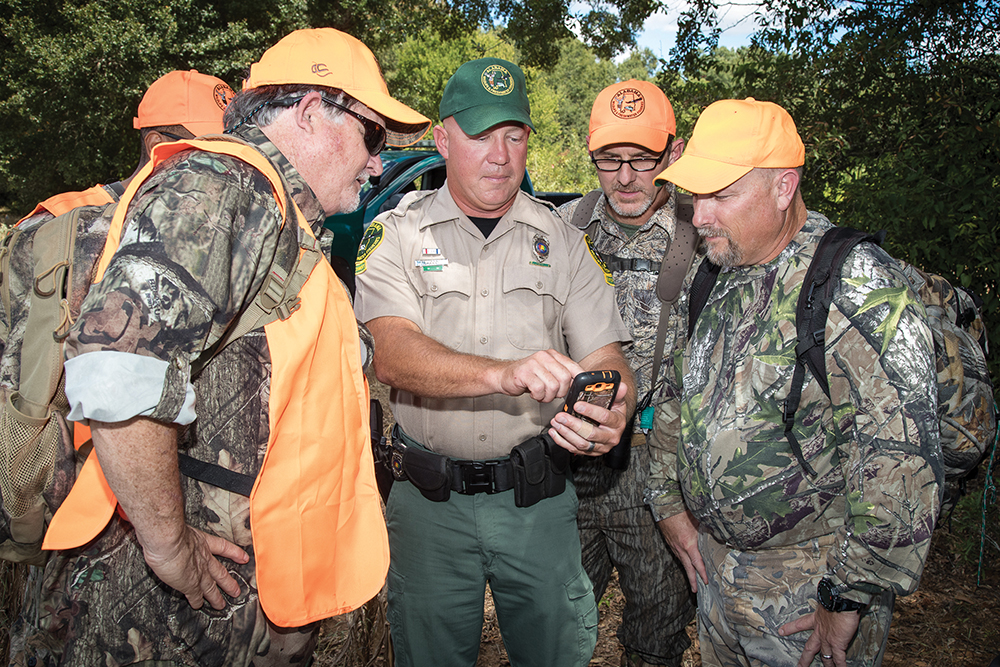With hunting seasons in progress or starting soon, hundreds of thousands of sportsmen will take to the fields, forests and wetlands all across Alabama to pursue everything from doves to deer. Most of them will obey all the laws and participate in a tradition as old as mankind.
But not everyone judiciously obeys every game law. Some make honest mistakes, while others just don’t care or think the laws don’t apply to them. For those people, heed this warning: Someone highly trained and armed may be watching.
By the late 19th century, many conservationists became alarmed by disappearing wildlife populations. For instance, fewer than 500,000 whitetail deer roamed the entire United States around 1900. Few game laws existed in the nation. Where laws existed, states did little enforcement.
About 110 years ago, in November 1907, Rep. Henry Steagall of Dale County introduced legislation to create a professional conservation department named the Alabama Department of Game and Fisheries. In 1971, it was renamed the Alabama Department of Conservation and Natural Resources.
“Steagall authored legislation to create a government agency with authority to protect the dwindling wildlife and fisheries resources of Alabama,” says Kevin Dodd, the executive director of the Alabama Conservation Enforcement Officers Association. “The timing of his actions might seem radical to us, as they occurred when much of the Alabama population lived in rural settings near poverty standards where any game, bird or fish was pursued mainly to supplement the table or family income.”

Photo by Billy Pope
According to Dodd, who spent 32 years as a conservation enforcement officer and retired earlier this year as the Alabama Division of Wildlife and Freshwater Fisheries chief of law enforcement, Steagall didn’t invent the idea of passing laws to protect wildlife. But he believed many previous laws failed because individual legislators could exempt their districts from the laws – or the local sheriff simply refused to enforce them.
“The legislation introduced by Steagall and supported by many others had been encouraged by outgoing Gov. William Jelks,” Dodd says. “By forming a new government agency to oversee the wise use of wildlife resources, the entire state would be affected rather than selected regions. The bill was a comprehensive package that addressed landowner rights and the use of public waters, established seasons and limits, defined game birds and animals, restricted several activities and mandated penalties for violations.”
The new governor, Braxton Comer, signed the bill into law and appointed Rep. John Wallace of Madison County to serve as the first Department of Game and Fisheries commissioner. Wallace promoted the concept of “conservation through education” to teach people about the laws and why they existed. He also appointed H.M. Henderson and W.F. Sirmon as the first conservation law enforcement officers, or game wardens. More appointments soon followed.
Wallace charged the wardens with enforcing all state game and fish laws. As incentive, the officers could keep a small portion of any fines collected from violators they caught.
“The logic of a state law enforcement officer, who answered to the commissioner rather than local voters, would prove to be the cornerstone that made the legislation successful,” Dodd says. “Turnover in warden ranks was frequent for the first few decades as the law and its enforcers were slow to gain public acceptance. Some of the 1908 convictions for violations of the new game law included a state senator, a sheriff and a county solicitor. Such prosecution would likely never have occurred when local sheriffs were solely responsible for enforcement.”
The new laws and the enforcement of them gradually became accepted as animal populations began to recover. During the Great Depression, the governor at the time decided to cut the game warden program to save money. Sportsmen across the state vociferously objected to that idea. The governor backed down and the game wardens stayed on the job.

“These citizens recognized that any progress gained over decades would be quickly lost if the enforcement arm of the game and fish program were diminished or removed, a fact that remains especially relevant today,” Dodd says. “The idea of a state law enforcement officer pledged to enforce laws protecting public wildlife resources was an idea born in North America and since copied around the world.”
Today, sportsmen contribute more than $2 billion annually to the Alabama economy and the populations of many game and fish species flourish. Twice as many whitetail deer live in Alabama now than existed in the entire nation a century ago. Sportsmen enjoy long seasons and liberal limits that allow everyone to participate in the great outdoors all year long if they wish.
However, new generations of highly trained professional “Wallace’s Wardens” are still watching. They continue to make sure everyone obeys the rules or suffers the consequences.
John N. Felsher lives in Semmes, Ala. He’s a professional freelance writer and photographer with more than 2,500 articles published in more than 150 different magazines. Contact him through Facebook.




